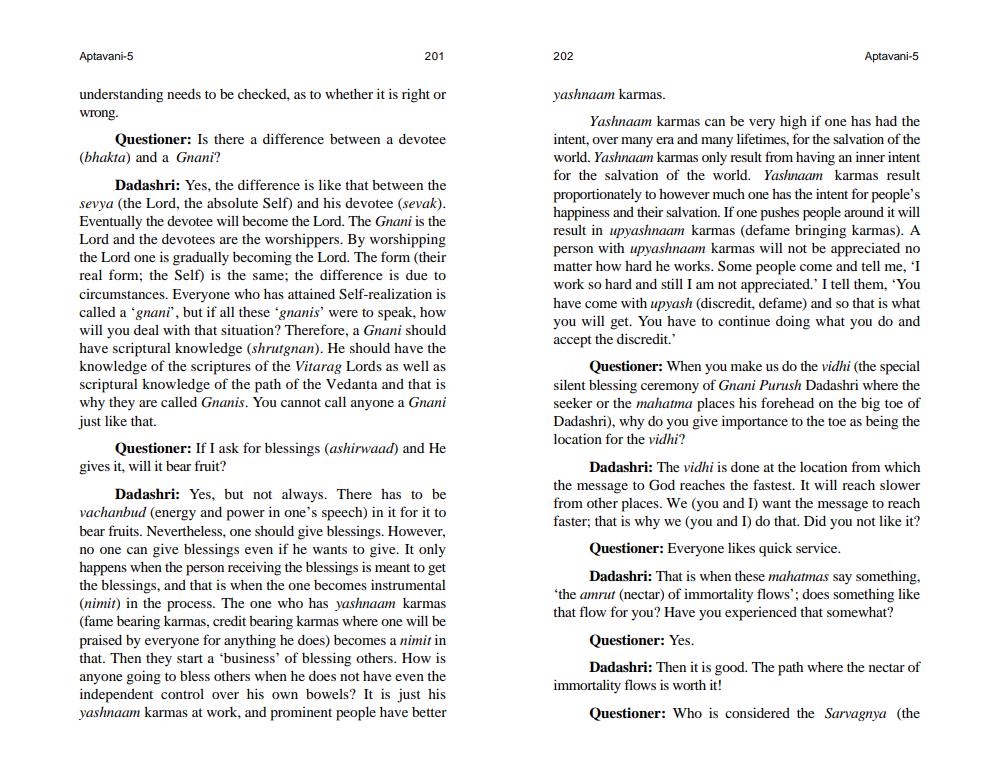________________
Aptavani-5
201
202
Aptavani-5
understanding needs to be checked, as to whether it is right or wrong.
Questioner: Is there a difference between a devotee (bhakta) and a Gnani?
Dadashri: Yes, the difference is like that between the sevya (the Lord, the absolute Self) and his devotee (sevak). Eventually the devotee will become the Lord. The Gnani is the Lord and the devotees are the worshippers. By worshipping the Lord one is gradually becoming the Lord. The form (their real form; the Self) is the same; the difference is due to circumstances. Everyone who has attained Self-realization is called a "gnani', but if all these 'gnanis' were to speak, how will you deal with that situation? Therefore, a Gnani should have scriptural knowledge (shrutgnan). He should have the knowledge of the scriptures of the Vitarag Lords as well as scriptural knowledge of the path of the Vedanta and that is why they are called Gnanis. You cannot call anyone a Gnani just like that.
Questioner: If I ask for blessings (ashirwaad) and He gives it, will it bear fruit?
Dadashri: Yes, but not always. There has to be vachanbud (energy and power in one's speech) in it for it to bear fruits. Nevertheless, one should give blessings. However, no one can give blessings even if he wants to give. It only happens when the person receiving the blessings is meant to get the blessings, and that is when the one becomes instrumental (nimit) in the process. The one who has yashnaam karmas (fame bearing karmas, credit bearing karmas where one will be praised by everyone for anything he does) becomes a nimit in that. Then they start a business' of blessing others. How is anyone going to bless others when he does not have even the independent control over his own bowels? It is just his yashnaam karmas at work, and prominent people have better
yashnaam karmas.
Yashnaam karmas can be very high if one has had the intent, over many era and many lifetimes, for the salvation of the world. Yashnaam karmas only result from having an inner intent for the salvation of the world. Yashnaam karmas result proportionately to however much one has the intent for people's happiness and their salvation. If one pushes people around it will result in upyashnaam karmas (defame bringing karmas). A person with upyashnaam karmas will not be appreciated no matter how hard he works. Some people come and tell me, 'I work so hard and still I am not appreciated.' I tell them, 'You have come with upyash (discredit, defame) and so that is what you will get. You have to continue doing what you do and accept the discredit.'
Questioner: When you make us do the vidhi (the special silent blessing ceremony of Gnani Purush Dadashri where the seeker or the mahatma places his forehead on the big toe of Dadashri), why do you give importance to the toe as being the location for the vidhi?
Dadashri: The vidhi is done at the location from which the message to God reaches the fastest. It will reach slower from other places. We (you and I want the message to reach faster; that is why we (you and I) do that. Did you not like it?
Questioner: Everyone likes quick service.
Dadashri: That is when these mahatmas say something, "the amrut (nectar) of immortality flows'; does something like that flow for you? Have you experienced that somewhat?
Questioner: Yes.
Dadashri: Then it is good. The path where the nectar of immortality flows is worth it!
Questioner: Who is considered the Sarvagnya (the




